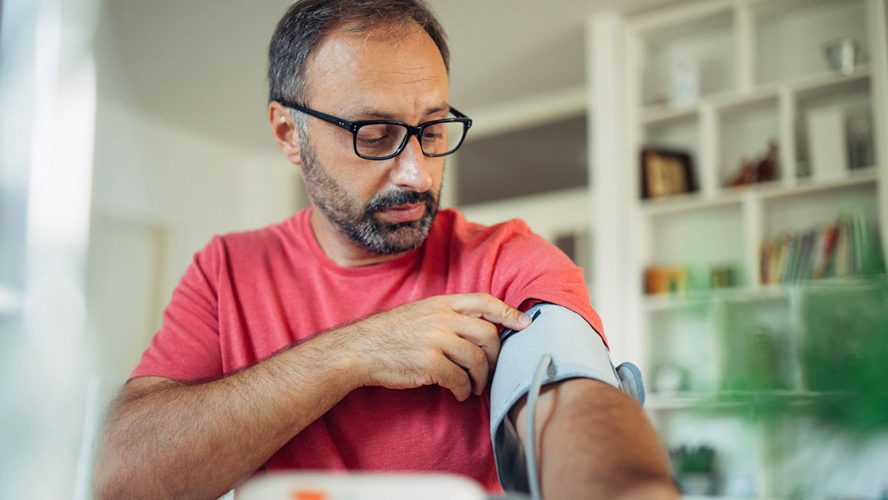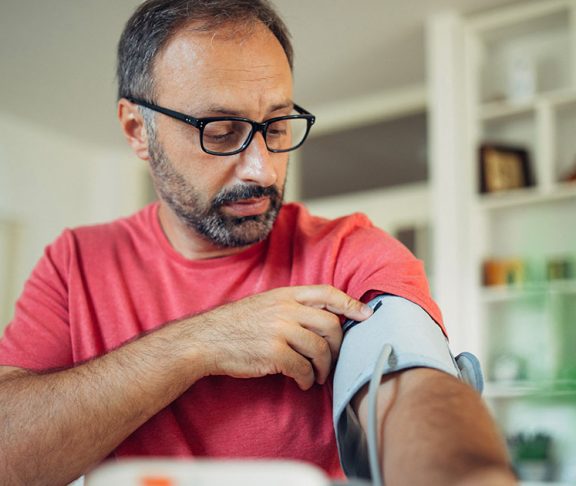With nearly half of the U.S. population having hypertension and only 1 in 4 adults having their condition under control, monitoring blood pressure becomes more and more crucial.
Studies show that monitoring blood pressure at home helps to manage and reduce high blood pressure. It also increases awareness and empowerment of adults with hypertension. An added benefit is that having a blood pressure monitor at home helps to prevent the white coat effect.
White coat effect
Monitoring blood pressure at the doctor’s office is generally considered the most accurate method. A disadvantage of this method is, however, the so-called “white coat effect” — being at the doctor’s office can cause stress, heighten a patient’s blood pressure, and cause a measurement to be inaccurately high. Inaccurate measurements should be avoided at all costs, as this may result in inadequate treatment of the patient’s problems.
A great solution for this is measuring your blood pressure comfortably at home. However, when using a home blood pressure monitor, users should be aware of how to use it and get proper instructions for accurate home use.
At-home devices
Whether or not a blood pressure measurement is accurate depends on a lot of factors. For example: having a full bladder can add 10-15 points to a blood pressure reading. Other factors that influence readings include taking a shower right before a measurement or talking while measuring.
To better understand how people use iProven blood pressure monitors at home, we asked individuals to take a video of themselves while taking their blood pressure. This allowed us to see how they take a measurement, which inspired us to create a proper instruction video: bit.ly/bpm656. With this video, we can provide people with even better, more thorough instructions.
Do’s and don’ts
- Taking a hot or cold shower or bath right before measuring can raise your numbers. Instead, wait 20-30 minutes.
- Don’t measure with a full bladder, as this can add 10-15 points to your reading.
- Sit back, take a deep breath, and relax before you start. Don’t move or talk while taking a measurement.
- Make sure to position the cuff at heart height.
- Don’t eat or drink hot or cold food or drinks right before you start.
Apart from the clinical testing procedures, iProven’s products are personally put through the wringer. This means they are tested extensively in the home setting. That’s how we discovered, for one of our thermometers, that a “mute” button would prevent a sleeping child from waking up when their temperature is being taken. Or what a difference it makes for your levels to sit back and relax a few minutes before taking a blood pressure measurement. Consistently trying our products at home prior to bringing them to market has helped us to make our products easier to use and to provide better instructions.
People come first and usability is the key.
Our mission is to make an impact on as many lives as possible. That’s why we’re proud to participate in multiple Health Care Programs, starting in 2020. This enabled us to bring accurate home blood pressure monitors to hundreds of thousands of households across the United States.
Recommendations for home blood pressure monitoring
- Start monitoring now, not when there is a problem. When there is a problem, you’re too late. Monitoring once a week is a good start. Contact a medical professional if you’re worried about your numbers.
- Make sure to compare your readings to professional results. Whether it’s at your yearly check-up or you already see a doctor for your blood pressure, make sure to compare notes.
- Monitoring is the basis of a good action plan. Only when you know your daily or weekly levels can you see the impact of lifestyle changes.
- Make sure to follow the instructions to perform correct measurements, see bit.ly/bpm656 for more information.
Get 15% off your BP Monitor for World Heart Day. Use Coupon Code: HEART21 at Checkout
To see iProven’s blood pressure monitor collection, visit iproven.com/collections/blood-pressure-monitors.


